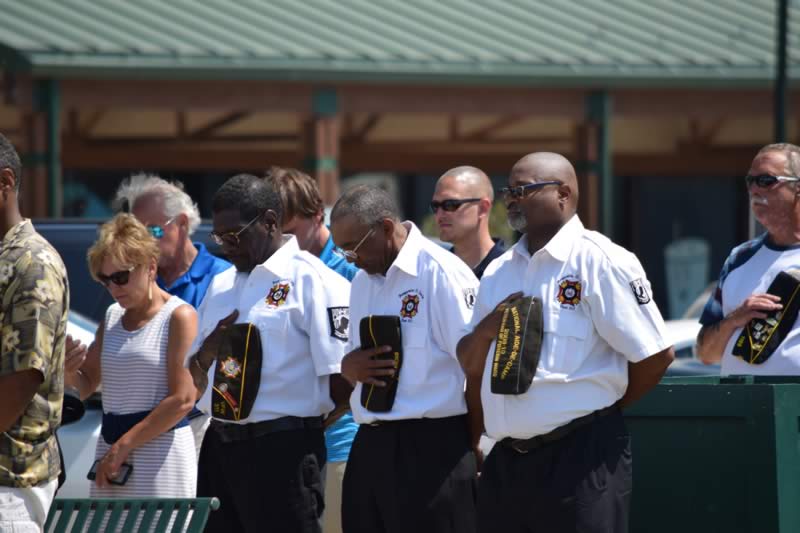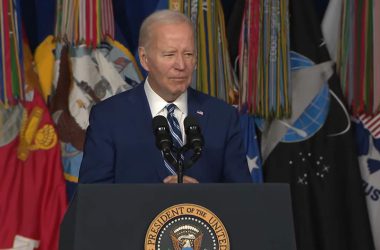Beuhring, Kuwait–(ENEWSPF)–December 9, 2014.
SECRETARY OF DEFENSE CHUCK HAGEL: General, thank you.
Please be seated.
To have an armor guy introduce an infantry guy is pretty good. It doesn’t get better than that. And I want to thank General Graves and General Terry and all of your leaders for what they do. But most important, I wanted to come out here for a few minutes today to thank you and to tell you how much we appreciate everything you do for this country.
This is a tough business, a tough job. You’ve got about as tough a job as anybody does in our business, and we know that, the country knows it, and we thank you for that. I also want to note that as we move into the holiday season, this is not an easy time for you, your families. Please give your families my thanks on behalf of all Americans.
Tell your families we appreciate what they do, the sacrifices they make along — along with you. So, again, thank you very, very much for what you do.
Our ambassador to Kuwait is here with us as well, and I want to thank him for what he does and his team at the embassy. And we work, all of us, as a team, which is the only way anything ever gets done. And I was reminded, again, as I came in here a few minutes ago and went over to the maintenance area and had an opportunity to thank all our maintenance people for keeping you all moving. Nothing flies, nothing runs, nothing works without the mechanics and the guys who actually keep us in business.
I told them that I thought of all the under-valued and under-stated and unglorified positions that we have, probably theirs is the most under-appreciated. Not to minimize everyone’s role, because it is a team effort, everything has to work together. And you all do it as well as any institution in the world. So, thank you for what you’re doing.
We’re going to have an opportunity to get into some questions here in a minute, and then after that, we’ll — we’ll take some photos and — and do some of that.
But let me just make a couple of comments before I open up and find out what’s on your minds.
I’m in this area for a couple of days. Just came in from Afghanistan last night, where we were for a couple of days and be here today, then over to Iraq tomorrow. And it’s important, as you all know, to get a sense of what’s happening in a sense of not just reading reports or getting briefs but to see it and to come out and feel it. And I’ve always made that a priority, and I think any — any of your leaders do, and all leaders do. So, that’s partly why I’m on this five day trip.
But, I wanted to particularly stop here in Kuwait to thank you for your mission, because what you do here, this task force, this combined joint task force, is really the centerpiece. It is the pivot point. It is absolutely critical to everything that happens as it moves out. And you know that. And again, when we talk about undervalued and sometimes under-recognized areas, I think — I think yours is, not that you all haven’t had different tours and many of you, many tours in Afghanistan, and Iraq, and away from home.
But this business of what you do right here is absolutely essential to make it all work. And you think of the 60 coalition partners that have been assembled to degrade and defeat ISIL, and the barbaric threats that ISIL and other terrorist extremist groups represent, not just to this region, but all of us, that is really pretty impressive, to be able to marshal that many countries, all participating, all contributing in their own way, but it can’t happen without the United States leadership. It won’t happen without our leadership. And it won’t happen without you. And it won’t happen without these kinds of efforts that are being made right here.
So, I — I wanted to make sure you knew that we know in Washington what you’re doing and why you’re doing it. So do all of our coalition partners who, like all of us, admire and respect everything you’re doing in every way you do it.
Second point, you all know because you have devoted your lives to the service of this country and the security of this country, that we live at a dangerous time. It’s an uncertain time. It’s a time in history we’ve really never seen before. That’s the result of many dynamics, technology, and a decentralization of power and capacity that we’ve never seen before, ungoverned spaces in ways we’ve really never seen before.
And I think sometimes, any of us, because we’re human beings, tend to think that its a hopeless effort. Well, nothing’s every hopeless. But it’s not hopeless. We’re working through this unprecedented historic time. And you are making history. You are defining much of the history that’s being made now, but more importantly, it’s for a purpose.
You are defining a future. You are defining a new world order. And everything you do every day. And every job’s important. Every component of every job is important, or we’ll fail — or we’ll fail. It takes leadership. It takes capability, capacity.
And I want you to know also that those responsible for this enterprise in this institution are committed to assuring that you have everything that you need, and to know and understand what your problems are, what your concerns are. You can’t do your jobs that we expect you to do. That you want to do if you’re bothered and worried about other things. And we’re here to make sure that that doesn’t happen.
Again, thank you very, very much for everything you do. And, happy holidays as we go into the holiday season. I know there’s some reflection of the holiday spirit here. And I have always admired that. I, once upon a time, was away from home over a holiday period in a different kind of war, so I have some understanding of what you and your families deal with when you have these important holidays. It means so much to family.
So, thank you very much.
So, general, colonel, I also want to recognize you. I understand you’re the mayor of this outfit and town marshal. When a cat gets caught up a tree, you find the cat and get the cat down. Thank you very much. Not an easy job. We all know that. So thank you all very much.
So, who’s got the first question? Or a comment. Anything you want to pass on.
Q: Mr. Secretary (inaudible) Bravo Company, 3159th out of Germany.
As — what is the way ahead for the Army aviation forces that are stationed in Europe? More pointedly, what is the way ahead for the attack battalions, the 64 battalions?
SEC. HAGEL: Well, you know — bet you all know that what has occurred in Europe over the last year, particularly the last few months as a result of the Russian invasion of Crimea and violation of the sovereign territory of Ukraine, has really changed the dynamics — the security dynamics in Europe.
That action and continued action has done more to coalesce and bring the 28 nations of NATO together than any one thing.
You know, too, that we have responded and are taking certain initiatives with our NATO partners in response to that. Aviators, aviation brigades, aviation power and presence are an essential part of that effort as we have picked up, we’ll continue to initiate new rotations in new places, not only on an accelerated basis, but also new missions along with our NATO partners.
The aviation brigade component of this is critical, as aviation, as you all know, is critical to our security and our warfighting capabilities, capacities.
So, the aviation brigades in our armed forces and particularly, your question about Europe has a very significant future.
Q: Mr. Secretary, Sergeant First Class Bokanowski, 2-34 Armor. I was wondering your thoughts on the recent firing of Bo Pelini?
SEC. HAGEL: (Laughter.) That’s a rather parochial question, but you and I understand that. Are you from Nebraska? Where are you from?
I’m sorry?
Q: Omaha.
SEC. HAGEL: Omaha. Well, congratulations. You got an unfair start in life.
Bo Pelini was the football coach at the University of Nebraska for seven seasons after a, what, nine and three record this year, and he’s all seven seasons, he’s won at least nine games and many seasons, 10. But they fired him.
And partly, he had a situation where he couldn’t produce any league championships and really couldn’t win tight games, big games, top 25 games. Now, take all sides of that equation.
But I think too, everyone has their own style, as you all know. I’ve always thought that toughest job in America is being a head football coach somewhere of a school that has expectations that their football team should be the national champion every year. And Nebraska is one of those schools, Alabama, you know, the rest of them.
So, I don’t think it was surprising, and his style was probably not a style that fit with a lot of Nebraskans and a lot of — a lot of parts to it. But we have a new coach, as you know, from Oregon State, and they’ll embrace him, the good people of Nebraska, and welcome him, and Pelini had a good run and I think all Nebraska fans are grateful for his — for his many, many victories. I think his lifetime coaching record, head coaching record at Nebraska was around 800 percent, which is not a — not a bad record to have.
But thanks for your question. Your parents still in Omaha? Tell them hello. I’m sure they voted for me in every election. (Laughter.) They’ve got a very smart son, so of course they did.
Thank you. And happy holidays to them.
Other comments or questions. Did you have? Right here.
Q: Master Sergeant Joe, BSTB Kuwait.
Sir, what would be your greatest accomplishment as secretary of defense?
SEC. HAGEL: Well, I’ll let others figure that out, but I think the thing that I’m as proud of as any is the — the team that we have built in the military. It is a responsibility of leadership, as you all know, to keep an enterprise strong, vibrant, ahead of the curve. And the greatest responsibility a leader has is to leave the institution strong, is to prepare the institution for the day you leave.
I was kidding all of our combatant commanders and our chiefs last week. We brought them in for our quarterly Secretary of Defense Strategic Leadership Conference, and we were talking a little bit about your question. And I said, “well, you all are familiar with the great Charles De Gaulle quote that graveyards are full of indispensable men.” He didn’t say women, but I’d include women in that. Point being that we all have the privilege of serving in our own way, in our own capacity, at our own time. We should all take advantage of that privilege, and you all do in every way, every day.
And I have so admired that and I have so looked forward to every day with all of you because you are as special a group of people as there is in the world. And to be part of that is the highest privilege anybody could have. So I think — I think just the entire, not just opportunity, but what I leave behind in strengthening and hopefully preparing and bringing good people, the best people along and helping them develop. I didn’t do it.
These are team efforts. No one person runs anything. I occasionally asked about different things and occasionally, somebody will say “it’s been a privilege to serve under you, Mr. Secretary.” And I always respond, “no one, no one serves under the secretary. We all serve together.”
All right. I’ll take one more question, then we’re going to take some pictures and okay, good. Yes?
Q: Mr. Secretary, Specialist Stockton, Charlie, 90th ASB. What advice do you have for soldiers who are frustrated with the shrinking budget and the effects it has on the opportunity for training, schools, and advancement?
SEC. HAGEL: Well, it’s a good question. And it’s something that we’ve been fighting for the last couple of years. And without going into all the details, see if I can give you a succinct answer to your question.
I think we’ve done a pretty good job of being able to, the last couple of years, work our way through the kind of abrupt, steep cuts that we’ve been taking. And I am hopeful, and I know hope is not a strategy, it’s not an operation, and it’s not a mission, but let me put it a different way. I have some confidence that we’re going to be able to get this turned around.
And at some point, sequestration will no longer be the law of the land. And the severe cuts that we have been taking and living with will level off and come down in a manageable way, which we can manage.
But back to your specific question, I think we’ve done a very good job of not cutting into a lot of the educational programs and benefits. Now, everybody’s had to take something. I know that. But we have tried to protect some of the essentials. I’ve always considered the education programs absolutely essential. In fact, I helped write the bill with a Republican co-sponsor, with Jim Webb, who was the leader of the bill, in rewriting the VA — the veterans bill, which we passed in 2008. That was one of my last major accomplishments in the Senate.
And Jim Webb, I think you all know Jim, is an old friend of mine. And we teamed up, and through a lot of opposition, we got it through. It was the first change since the Montgomery bill. And we were living in a different time.
And so, I’ve always thought education, and I’m not the only one, opportunities for our people are not only going to be critical for you right now, but particularly for continued recruitment and retention of quality people. You all are too smart. You all have too many options. You’re not going to stay at an institution that not only doesn’t value education or promote it or enhance it, but doesn’t do something about it.
And I think one of the things that we were able to do in that GI Bill that Jim Webb and I — when I was, again, the lead Republican on it, what we did was do that. But now we’ve got to sustain it on readiness. It’s something that you have heard from the chiefs, from me, from all of our leaders. That is something that we cannot compromise on.
And I know we’ve — we took some hits last year on this. We’ve been able to build back some of that this year because we were able to get a budget agreement for this year and next year that gives us some relief, but all that comes back, those cuts in readiness and every component of our budget, unless sequestration goes away.
But I’ve said, General Dempsey has said, all of our leaders have said that we will — we will not send you into combat — into harm’s way at any time, anywhere, unless we believe and your generals, your sergeants majors, your leaders believe you are ready. Not just capable and with the technological edge and the weapons edge, but you’re ready.
And readiness is essential to all of you, to our national security, as any one component of this — of this operation. So, we will not — we will not sacrifice readiness.
Thank you all again, and happy holidays. Thank you very much. (Applause.)
Source: defense.gov








